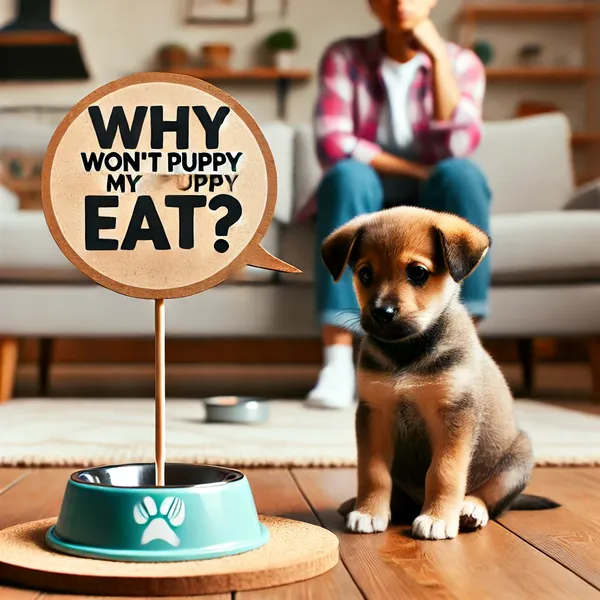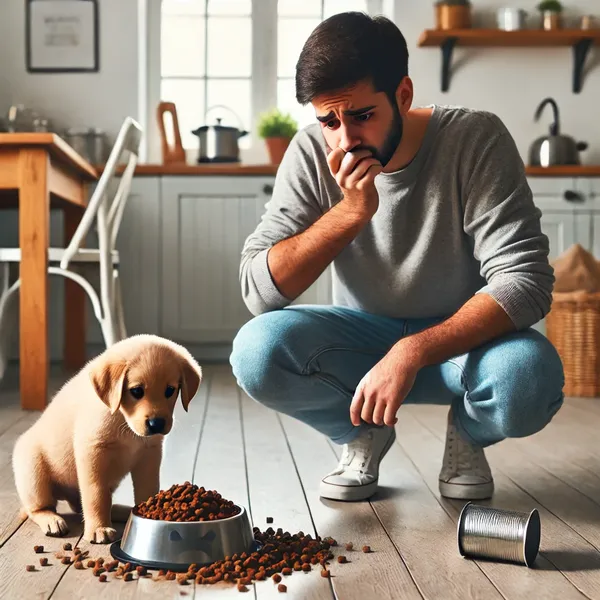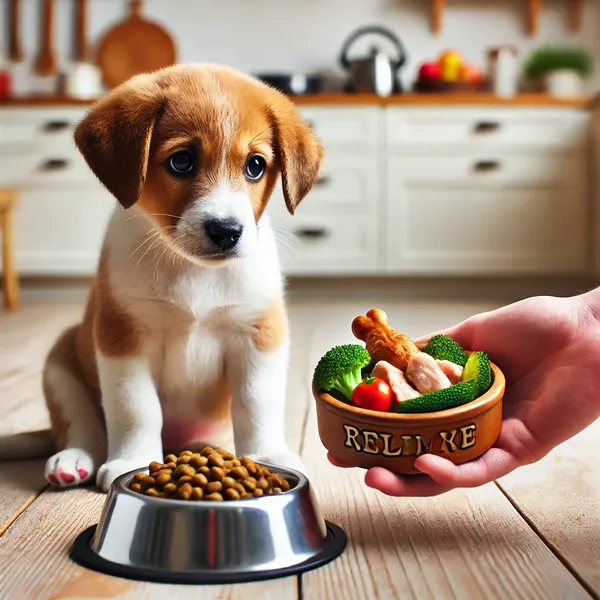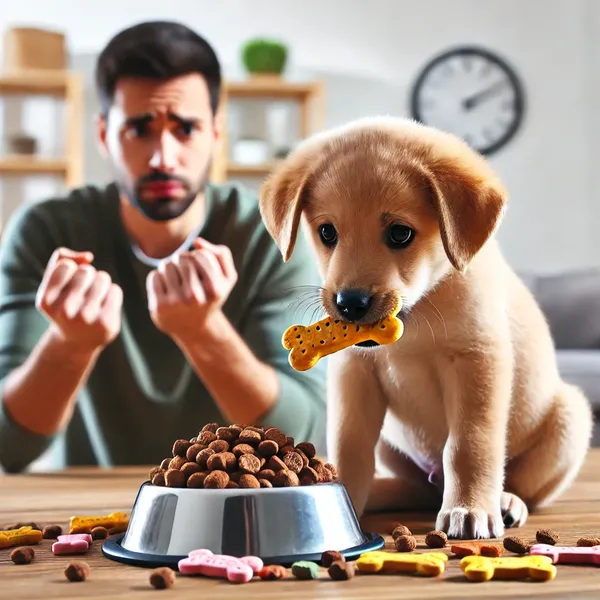What to do when your puppy refuses to eat – Everyone is delighted when one brings a puppy home. There is this bundle of joy running all over. But the question is, how would you feel if, all of a sudden, your puppy refuses to eat? That could be a cause for concern.
Calm yourself down, though. Like human beings, most puppies have days when they will not eat. However, if appetite loss is chronic, there are remedy measures to ensure her appetite improves. In this piece, let us look at elementary steps to help your puppy regain her love for food.
Puppy Won’t Eat: Why Is That?

Now, solutions are great, but we first need to identify the cause of the problem, which in this case is the puppy’s apparent lack of eating. Several factors can play a role:
- Stress or Anxiety: All puppies are easily stressed by their new environment. Suppose you only recently introduced the puppy home. In that case, the young canine is probably still adjusting to the new place, creating a loss of appetite for some time.
- Illness or physical discomfort: Puppies can be wise enough to know they are sick and refuse to eat. Therefore, loss of appetite could also be a factor of concern.
- Food Preferences: Puppies can be spoilt for choice at times! Sometimes, they do not fancy the type of food you are giving them.
- Pain because of Teething: Puppies begin to have teeth around the age of three to four months. They may experience teething difficulties when eating more complex foods.
- Changes in Feeding Schedule: Puppies live on a schedule. Changes in the feeding time or location can throw them off.
What to Do When Your Puppy Refuses to Eat

Steps to encourage your puppy to eat again
Now that we have discussed several possible causes, it is time to focus on how you can help persuade your puppy to eat. Do not worry – most of these steps are more accessible than you expect and can have quite an impact!
1. Make Sure There Are No Medical Issues
Prioritising health, a veterinary consultation is recommended if your puppy goes more than a day without food. After all, puppies do not always vocalise their pain and may not eat due to an ailment. Pay attention to any of the following signs:
- Bouts of vomiting or diarrhea.
- Extreme tiredness or muscle weakness.
- Experiencing a cough or running nose.
- Abdomen enlargement.
If they exhibit any of these signs, an immediate vet appointment is necessary!
2. Make Mealtime Fun
Eating should be enjoyable for your puppy! Here are some ways to make feeding time fun and exciting:
- Use Puzzle Feeders: Puppy puzzle feeders are a great way to engage your puppy. They are like a game! Besides, they can also help control their eating speed when they tend to eat too fast.
- Play Before Meals: A tired puppy is a hungry puppy! A very brief play session before the meal may help increase the puppy’s appetite.
- Hand Feeding: At times, your puppy may only require some coaxing. Hand-feeding can be restorative, as it makes your puppy feel loved and secure, which might, in turn, stir their desire for food.
3. Create a Relaxed Atmosphere
the dog is very distracted or anxious when it comes to mealtime. For instance, if your Tempologic puppy refuses to eat, check if the dog’s eating area has distractions that are inclined to cause anxiety.
For instance, there are feral loud noises, objects of interest, other companion animals or pets that do not eat, and so on. Also, feeding your puppy daily at the same time and place would improve its emotional state.
4. Try Different Foods
Okay, so your puppy has an aversion to the food you are presenting; let’s get risky now! That is to say:
- Change Food Types: Most puppies are unique in their likes, especially regarding food. Most of the time, it is reasonable to stick to just one food brand. Change the flavour or even the types of food. Aim for some good-quality puppy food that tastes good and is nutritious.
- Wet Foods Or Dry Foods: A puppy on dry kibble might also be provided with some wet food. Puppies fed dry kibble can also be supplemented with wet food, as it has a different texture and usually enhances the smell and taste.
- Heated Meals: Heating the puppy’s food to a certain degree can enhance its flavour, making it more appealing to the puppy.
5. Try and Stick to a Feeding schedule
One thing you should understand is patience. For instance, if one day you’re feeding the Dalmatian puppy at different hours and another day you show up differently, they may be confused. It is recommended that you feed the puppy within the same window of time every day. In addition, do not leave food all the time; instead, only allow access for around 10 – 15 minutes. If they refuse to eat, remove the food and attempt again later.
6. Make Sure the Food Bowl is Right
Sometimes, the container holding food can also be an issue! Consider the following points:
Is the food bowl disinfected? These pets are very keen on scents. A clean bowl ensures appetising food.
Is the bowl’s height adjustable? For the puppy’s comfort, make sure the bowl is at the proper height.
Does your cute puppy use alternative eating utensils? Some puppies might avoid metal bowls due to the sound or brightness they reflect. Use materials such as plastic or ceramics that do not reflect as much.
7. Monitor Treats and Snacks
Puppies do not accept the consumption of tummies when many treats are offered throughout the day. They are kids, so they take every treat offered and threaten to refuse primary meals. Try to reduce the relaxation of the rules on treats to check if this is of any help.
What Not To Do When Your Puppy Is Not Eating

If you want to help your puppy eat, there are many things that you have to refrain from doing:
- Do not give too many treats: As stated above, your puppy may lose its appetite. Therefore, only small portions may be provided during training and as rewards.
- Do Not Feed Your Puppy Human Food: Human food may upset your puppy’s stomach and encourage bad behavior. Puppies, for example, are prone to demanding table scraps, which only results in them being picky eaters.
- Don’t Try To Gaze It Down: Never attempt to force your puppy to eat. This may create tension during feeding time and develop a negative attitude towards food.
When To Book An Appointment With The Veterinarian
When your puppy does not eat for more than a day and a half, it is advisable to see a veterinarian. Puppies have high energy demands, and not eating can cause problems like low blood levels. Don’t postpone when your puppy starts exhibiting disease symptoms like vomiting, diarrhea or lack of energy—call the vet right away.
How To Help Your Puppy Eat Well
Every pet parent should realise the nutritional needs of their pup. Puppies need a diet adequate in proteins, fats, carbohydrates, vitamins, and minerals to grow healthy and strong. Such growth nutrients are contained in good puppy food.
| Nutrient | Why It’s Important |
| Protein | Helps build muscles and repair tissues. |
| Fat | Provides energy and supports brain health. |
| Carbohydrates | Gives your puppy energy to play and explore. |
| Vitamins | Supports growth and immune function. |
| Minerals | Strengthens bones and teeth. |
Alternative for Pet Food

It may strike you that preparing your puppy’s meals in your kitchen could be a good idea. Although this might be the case, it is advisable to seek advice from your veterinary officer first. No one can argue that the balanced diet will also be homemade.
Certain foods help puppies during their growth stages but will not be available in the homemade food. In case you would like to experiment with the homemade diets, ensure that, among other options, contain;
- Low-fat chicken, turkey or beef without skin.
- Taking in some vitamins with vegetables such as carrots or peas.
- Some healthy carbohydrates like rice or oatmeal are used for energy and filling.
Teething and Appetite Do You Know Such Facts?
They develop at 3-6 months old when puppies cut teeth. During this time, some puppies tend to eat less due to some pain experienced; this is usually temporary. Read on for suggestions to assist with teething:
- Make it easier on them and soften the food: try soaking dry kibble in water or broth so it isn’t as hard to chew.
- Use cold chew toys: Give your pup cold chew toys so they can help soothe their gums.
- Give frozen treats: Frozen dog-safe treats can also be offered to help numb the pain.
Make an ‘Eat’ Activity, Feeding Tips for Picky Eaters
Why does my puppy refuse to eat all types of food? More often than not, puppies can indeed be picky eaters, but there is no need to lose hope. Here are a few tips to help your picky eater train her palate:
- Mix flavors: Combine two flavors of the same puppy food.
- Broth boosts: Add low-sodium chicken or beef broth to the puppy’s food for flavour.
- Plain pumpkin: A teaspoon of pure, canned pumpkin (as opposed to the pie filling) may be extra healthy and quite palatable as an addition to the meal.
Common Mistakes When Feeding Puppies

There is an excellent chance that you will ruin your puppy’s feeding schedule. Here are some of them and how to avoid them.
- Feeding an ideal or inappropriate amount: Adhere to the feeding guidelines on the puppy food package, or better still, seek your veterinarian’s opinion on a perfect amount based on the puppy’s breed and size.
- Changing food too abruptly: If you’re changing your puppy’s food, mix the new food a little bit each day for a week before completing the switch.
- Disregard your puppy’s preferences: Some puppies choose textures, such as soft and hard food. Make sure to know what they like most.
Importance of Hydration
Like food, hydration should be a priority in your puppy’s health. Water is vital for puppies and essential for active ones. Always let them have access to clean water at all times. If your puppy is not eating, then it is best to check how much water has been taken in. Lack of water can cause discomfort, so encourage them to drink water by providing them with clean and fresh water regularly.
When is Fasting Normal in Puppies?
It is also worth mentioning that some periods of fasting are relative when it comes to puppies, particularly due to changing surroundings or diet. However, extended periods of starvation, in this case, are not good. Puppies have small tummies and need to chow down a few meals in sufficient frequency instead of feeding, which will drain away their energy.
References
– [American Kennel Club (AKC) – Puppy Feeding Guide] (https://www.akc.org/expert-advice/nutrition/puppy-feeding/)
– [ASPCA – Dog Nutrition Tips] (https://www.aspca.org/pet-care/dog-care/dog-nutrition-tips)
– [PetMD – Why Won’t My Puppy Eat?] (https://www.petmd.com/dog/puppy-nutrition/why-wont-my-puppy-eat)
Conclusion
Finding a way to feed your puppy may require some time and effort, but it should not be an impossible task. It is important to remember the following:
- Do not lose your temper.
- Make eating fun.
- Follow a schedule.
Every puppy is different, and sometimes, a little more TLC is all that is required. If all the suggestions have been exhausted and your puppy refuses to eat, please contact your veterinarian. After all, the purpose is to ensure that your new furry baby remains in good condition.
Following these simple steps will ensure that your puppy will look forward to mealtime in no time!